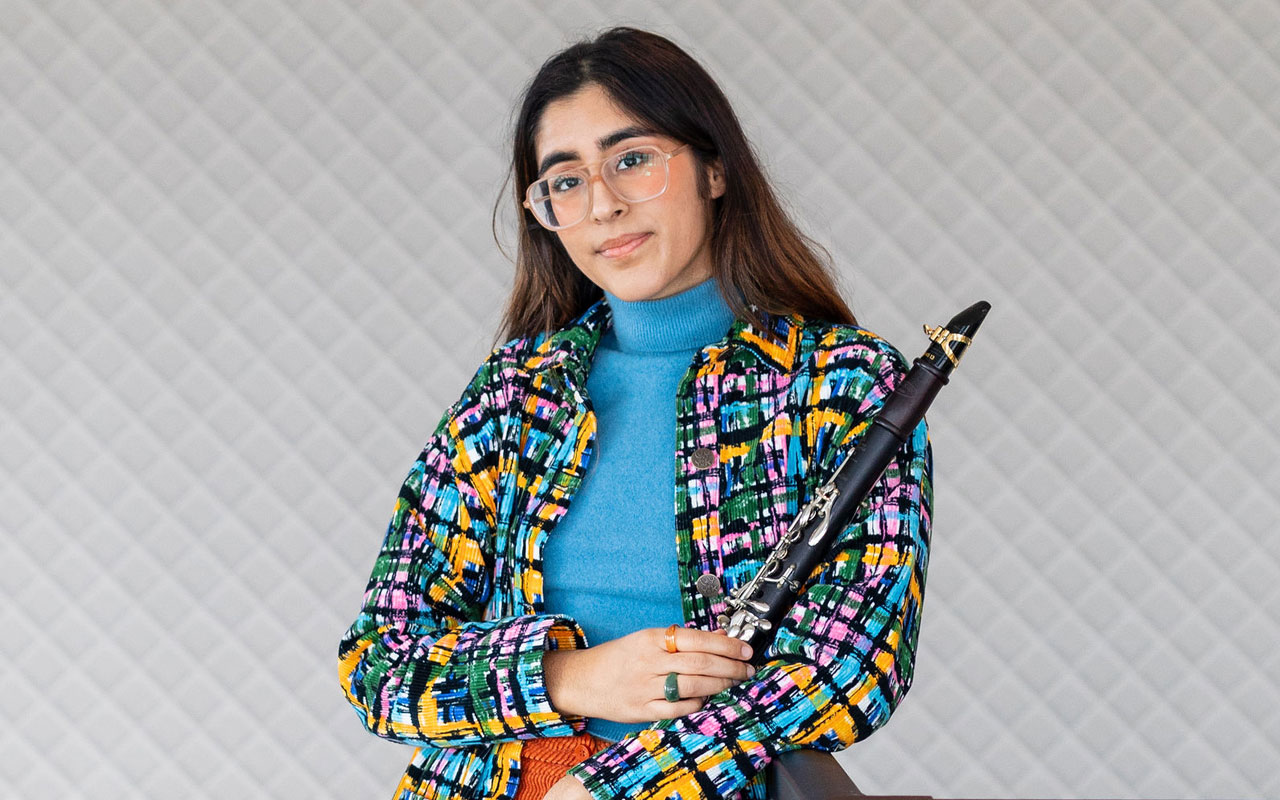
Jahnvi Madan photo by Krystal Graylin
Earshot Jazz is thrilled to announce Jahnvi Madan, Sheridan Riley, and Carlos Snaider, as the three commissioned artists who’ll be presenting the world premiere of their works at the 2023 Earshot Jazz Festival. As we head into festival season, we’ll be introducing these three, brilliant artists here. This month, meet Jahnvi Madan as she navigates injury, recovery and re/discovery.
For clarinetist Jahnvi Madan, one of three composers commissioned to introduce new works at the 2023 Earshot Jazz Festival, the last year has been a time of reflection and renewal.
Burned out by a hectic junior year at the prestigious New England Conservatory of Music (NEC), last summer Madan moved back to her family’s Bellevue home to regroup. “I meant to take just a semester off, but I started dealing with this jaw pain,” she says. Temporarily unable to play, Madan was forced to take a full gap year.
Consulting with a variety of specialists, she learned that her preferred clarinet setup had for years required her to overexert herself nearly every time she played. Since last October, Madan has rebuilt her technique from the ground up, working hard to shed the notion that playing harder is playing better.
While she initially resisted relaxed breathing and a gentler embouchure, Madan has learned to appreciate the musical results. “I think it’s definitely audible because I feel like, as much as I had a good sound before, I was still visibly always tense, and I think, like, it impacted my ability to have an evenness throughout my whole range or to play longer passages without changes happening,” she says.
Now that she is on the mend, Madan is resolved to approach her playing with a greater sense of mindfulness: “How did I take my breath, and how did I shape my mouth? And how does that specific note sound? And do I want to do it all again until it feels the best it can feel?”
In retrospect, Madan realizes that her burgeoning musical skill may have masked the deficiencies in her mechanics. “It’s impacted my teaching a lot because now I know how to talk about things beyond, is it producing the right effects?” Continuing she says, “I think that’s how most teachers think, and nobody ever noticed I had these issues because I could sound good, but there’s so much more to it.”
As a proud alumna of the Girls Ellington Project, Madan had always intended to spend her break from NEC as an instructor at Seattle JazzED, but as her time away grew, so did her role. In addition to her teaching portfolio, Madan works on JazzED’s administrative side, helping manage the organization’s fundraising efforts, and succeeding her mentor Kelly Clingan, JazzED’s education director, as organizer of this year’s Femme Jazz Day event.
Madan believes her connection to JazzED makes her work all the more meaningful. “Even when I’m doing work that’s not inherently musical, like if I’m writing a grant or something, I feel like it makes me always feel passionate about what I’m doing, and excited for it because I know where that money would be going.”
Lacking a musical outlet during her recovery, Madan pursued composing; if not for her extended downtime, she doubts she would have applied for the Earshot commission.
New to composing when she arrived at NEC, Madan first wrote her own music for class assignments. Two pieces, in particular, have become personal favorites: “Honeycrisp,” a Jimmy Giuffre-inspired contrafact of “Mack the Knife,” and “Home,” a guided improvisation that encourages the performers to reflect on the times they felt most at peace, then musically transmit that feeling to the audience. While Madan says some of her classmates chafed under the assignments’ restrictions, she thrived within the creative framework they provided. “Just being like ‘You need to put these limitations on what you can write’ has been really helpful…in terms of making the blank page feel more approachable,” she says.
For her festival premiere, Madan is composing a suite of songs based on her identity as a first-generation Indian American who is “navigating a lot of the experiences that come along with that.” As for orchestration, “I’m envisioning a five-person ensemble with clarinet, rhythm section, one other horn, and probably vocals, but it hasn’t come together yet. It’s still in the beginning stages.”
As she develops her piece, Madan has considered whether music is capable of conveying her experiences at all. “I really struggled with, you know, is there something I have to do to prove I’m expressing that, because it is so abstract,” she says. “I read interviews with Indian American musicians I look up to, like Vijay Iyer and people like that. And I realized that whatever I write is going to authentically express that experience because my identity and my art have always been inseparable. Who I am has been the root of my creative self-expression since I first picked up an instrument.”